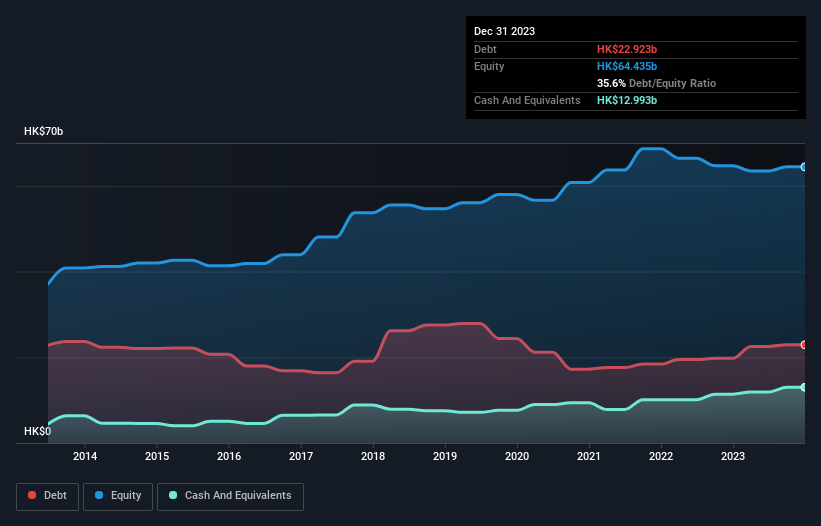We Think Kingboard Holdings (HKG:148) Is Taking Some Risk With Its Debt
Legendary fund manager Li Lu (who Charlie Munger backed) once said, 'The biggest investment risk is not the volatility of prices, but whether you will suffer a permanent loss of capital.' When we think about how risky a company is, we always like to look at its use of debt, since debt overload can lead to ruin. Importantly, Kingboard Holdings Limited (HKG:148) does carry debt. But should shareholders be worried about its use of debt?
Why Does Debt Bring Risk?
Debt assists a business until the business has trouble paying it off, either with new capital or with free cash flow. Ultimately, if the company can't fulfill its legal obligations to repay debt, shareholders could walk away with nothing. However, a more usual (but still expensive) situation is where a company must dilute shareholders at a cheap share price simply to get debt under control. Of course, debt can be an important tool in businesses, particularly capital heavy businesses. The first thing to do when considering how much debt a business uses is to look at its cash and debt together.
Check out our latest analysis for Kingboard Holdings
What Is Kingboard Holdings's Net Debt?
As you can see below, at the end of December 2023, Kingboard Holdings had HK$22.9b of debt, up from HK$19.7b a year ago. Click the image for more detail. However, it does have HK$13.0b in cash offsetting this, leading to net debt of about HK$9.93b.

How Strong Is Kingboard Holdings' Balance Sheet?
We can see from the most recent balance sheet that Kingboard Holdings had liabilities of HK$18.9b falling due within a year, and liabilities of HK$15.6b due beyond that. Offsetting these obligations, it had cash of HK$13.0b as well as receivables valued at HK$11.5b due within 12 months. So its liabilities outweigh the sum of its cash and (near-term) receivables by HK$10.1b.
While this might seem like a lot, it is not so bad since Kingboard Holdings has a market capitalization of HK$22.9b, and so it could probably strengthen its balance sheet by raising capital if it needed to. But it's clear that we should definitely closely examine whether it can manage its debt without dilution.
In order to size up a company's debt relative to its earnings, we calculate its net debt divided by its earnings before interest, tax, depreciation, and amortization (EBITDA) and its earnings before interest and tax (EBIT) divided by its interest expense (its interest cover). Thus we consider debt relative to earnings both with and without depreciation and amortization expenses.
Kingboard Holdings's net debt is sitting at a very reasonable 1.6 times its EBITDA, while its EBIT covered its interest expense just 4.8 times last year. While that doesn't worry us too much, it does suggest the interest payments are somewhat of a burden. Importantly, Kingboard Holdings's EBIT fell a jaw-dropping 53% in the last twelve months. If that earnings trend continues then paying off its debt will be about as easy as herding cats on to a roller coaster. The balance sheet is clearly the area to focus on when you are analysing debt. But ultimately the future profitability of the business will decide if Kingboard Holdings can strengthen its balance sheet over time. So if you're focused on the future you can check out this free report showing analyst profit forecasts.
Finally, a company can only pay off debt with cold hard cash, not accounting profits. So we always check how much of that EBIT is translated into free cash flow. Looking at the most recent three years, Kingboard Holdings recorded free cash flow of 45% of its EBIT, which is weaker than we'd expect. That's not great, when it comes to paying down debt.
Our View
We'd go so far as to say Kingboard Holdings's EBIT growth rate was disappointing. Having said that, its ability handle its debt, based on its EBITDA, isn't such a worry. Once we consider all the factors above, together, it seems to us that Kingboard Holdings's debt is making it a bit risky. That's not necessarily a bad thing, but we'd generally feel more comfortable with less leverage. When analysing debt levels, the balance sheet is the obvious place to start. But ultimately, every company can contain risks that exist outside of the balance sheet. Be aware that Kingboard Holdings is showing 1 warning sign in our investment analysis , you should know about...
At the end of the day, it's often better to focus on companies that are free from net debt. You can access our special list of such companies (all with a track record of profit growth). It's free.
Valuation is complex, but we're here to simplify it.
Discover if Kingboard Holdings might be undervalued or overvalued with our detailed analysis, featuring fair value estimates, potential risks, dividends, insider trades, and its financial condition.
Access Free AnalysisHave feedback on this article? Concerned about the content? Get in touch with us directly. Alternatively, email editorial-team (at) simplywallst.com.
This article by Simply Wall St is general in nature. We provide commentary based on historical data and analyst forecasts only using an unbiased methodology and our articles are not intended to be financial advice. It does not constitute a recommendation to buy or sell any stock, and does not take account of your objectives, or your financial situation. We aim to bring you long-term focused analysis driven by fundamental data. Note that our analysis may not factor in the latest price-sensitive company announcements or qualitative material. Simply Wall St has no position in any stocks mentioned.
About SEHK:148
Kingboard Holdings
An investment holding company, manufactures and sells laminates, printed circuit boards (PCBs), magnetic products, and chemicals in the People’s Republic of China, rest of Asia, Europe, and the United States.
Flawless balance sheet established dividend payer.
Similar Companies
Market Insights
Community Narratives



